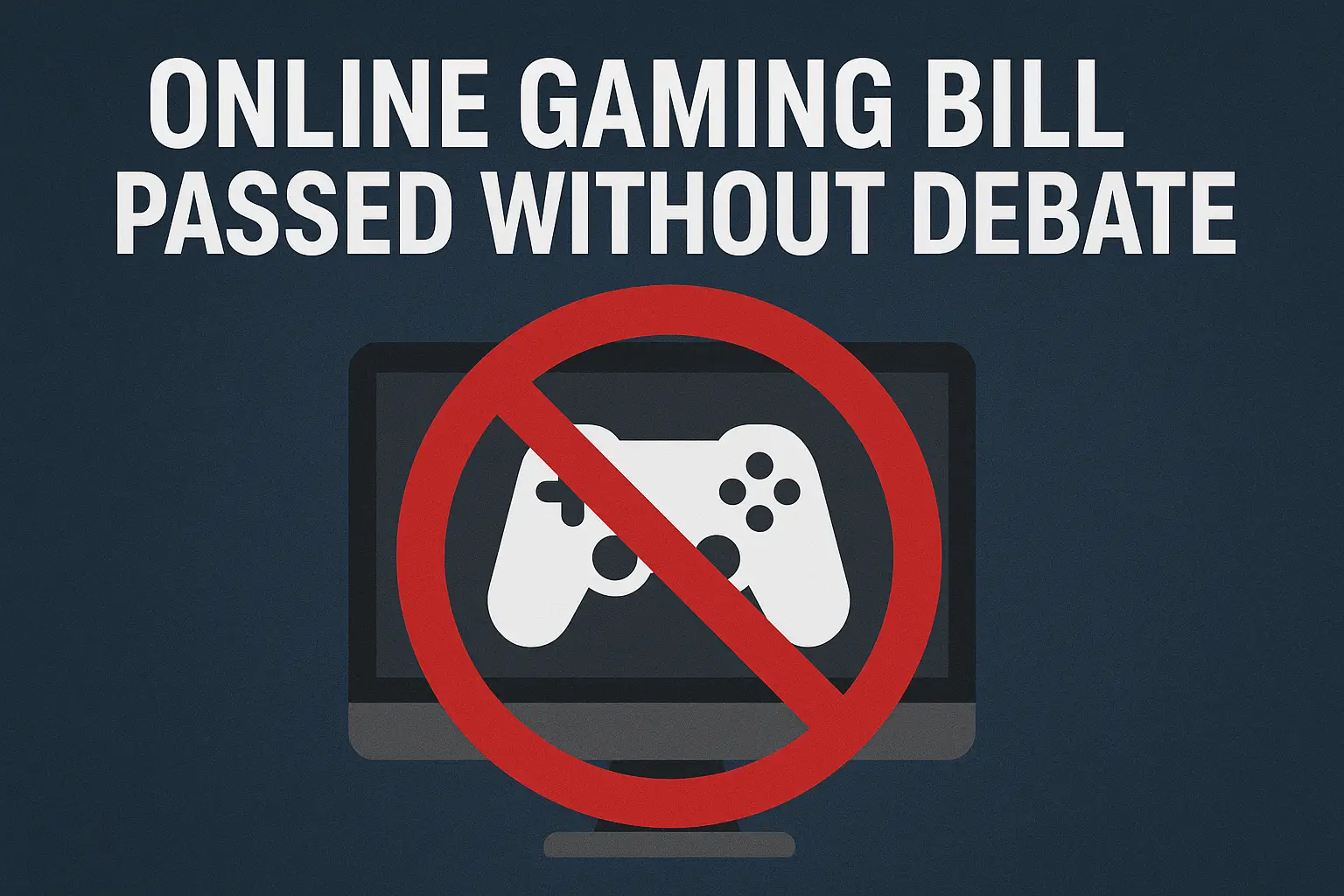New Delhi | August 21, 2025 (BTN24) – In a move that has stunned both the gaming industry and political observers, the Lok Sabha on August 20 passed the Promotion and Regulation of Online Gaming Bill, 2025, without any debate. The very next day, the Rajya Sabha also cleared the Bill amid opposition protests, setting the stage for a sweeping overhaul of India’s online gaming landscape. The legislation now awaits presidential assent, which is widely expected in the coming days.
What the Bill Does
The new law bans all real-money online games, including fantasy sports platforms, poker, rummy, betting, and other stake-based apps. Popular services such as Dream11, MPL, PokerBaazi, Zupee, My11Circle, WinZo, and RummyCircle are among those directly affected.
The Bill not only prohibits playing such games but also imposes restrictions on advertisements, endorsements, and financial transactions linked to them. Banks, UPI apps, and payment processors will be barred from processing payments for these platforms.
At the same time, the legislation draws a clear distinction: e-sports and educational/social gaming are exempted and will be actively promoted as safe forms of digital entertainment.
To regulate this ecosystem, the Bill mandates the creation of a National Online Gaming Authority, which will classify games, grant approvals, handle complaints, and block illegal platforms.
Penalties and Enforcement
The Bill prescribes strict punishments to deter violations:
- Running real-money platforms: Up to 3 years in jail and/or ₹1 crore fine.
- Advertising such games: Up to 2 years in jail and/or ₹50 lakh fine.
- Payment facilitation: Up to 3 years in jail and/or ₹1 crore fine.
- Repeat offences: Up to 5 years in jail and fines up to ₹2 crore.
Certain offences are classified as cognizable and non-bailable, giving authorities powers of warrantless search and seizure in serious cases.
Government’s Justification
Union Minister Ashwini Vaishnaw, who introduced the Bill, said the urgency was necessary because “online money gaming has become a bigger issue than drugs.” He highlighted cases of young Indians taking their own lives after incurring massive losses in online games, calling the legislation a much-needed safeguard for families and society.
Industry Shock and Economic Fallout
The decision has sent shockwaves through India’s booming online gaming sector, which was valued at over ₹31,000 crore annually and contributed more than ₹20,000 crore in taxes. Industry reports projected the sector to double by 2028, but the new law has thrown those forecasts into uncertainty.
Companies backed by global investors—including Tiger Global and Peak XV—now face shutdown risks. Stock markets reacted sharply: Nazara Tech shares plunged over 21% in two days, while Delta Corp also recorded double-digit losses.
For the thousands employed in the sector, the future now hangs in the balance.
Opposition Voices Concern
The Opposition strongly criticized the manner in which the Bill was passed.
- Karti Chidambaram (Congress) called it a “knee-jerk reaction” and demanded referral to a parliamentary committee.
- Shashi Tharoor argued that global models show regulation and taxation—not blanket bans—are more effective in tackling gaming addiction while preserving economic opportunity.
Several industry bodies, including the Federation of Indian Fantasy Sports (FIFS) and the E-Gaming Federation, have warned that the ban could stifle innovation, drive users to unregulated offshore platforms, and cause heavy revenue loss for the government.
A Turning Point for India’s Digital Future
The passage of this Bill—amid one of Parliament’s stormiest sessions in recent memory—marks a defining moment for India’s digital economy. Supporters hail it as a necessary shield against addiction and fraud, while critics fear it could push a thriving industry underground.
For millions of Indian gamers, parents, investors, and entrepreneurs, the coming months will reveal whether this bold legislative gamble proves to be a safeguard—or a setback—for India’s digital future.

